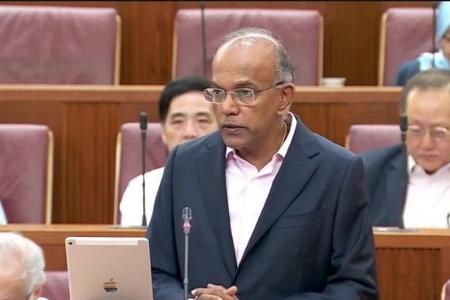Police officers need latitude to make quick decisions, not have actions unfairly critiqued
The Ministry of Home Affairs (MHA) and the Attorney-General’s Chambers (AGC) are considering appealing against the High Court’s recent decision to award a man who sued the police $20,000 in damages for false imprisonment.
Minister for Home Affairs and Law K. Shanmugam said in Parliament on Tuesday that MHA and AGC are taking a closer look at the court’s reasons for reaching its conclusions, and that the Government will also make changes to the law to close any gaps between its policy intent and current laws if necessary.
Stressing the importance of empowering police officers to make quick ground decisions while working in high-stress environments, Mr Shanmugam said an environment where police actions are unfairly critiqued will undermine public trust in the police.
“It will also lead to defensive policing, where the ground officers will try to do the least possible,” he said. “They will fear that everything they do will be over-analysed and picked apart unfairly. It would be easier in such situations to not do anything.”
Responding to questions from Mr Ang Wei Neng (West Coast GRC) and Mr Saktiandi Supaat (Bishan-Toa Payoh GRC), Mr Shanmugam said the police have told him they take different view from the decision reached by the court.
“The police and AGC will look at these points and decide whether the court’s decision should be appealed,” he said.
In a written judgment issued in January, Justice Philip Jeyaretnam found that police officer Mohamed Rosli Mohamed had made up the observation that Mr Mah Kiat Seng, 48, had been mumbling to himself and had spat into a plastic bag, to justify apprehending him under the Mental Health (Care and Treatment) Act.
The officer initially claimed in an affidavit that Mr Mah was “mumbling to himself at times” but later withdrew the assertion after viewing body-worn camera footage.
Justice Jeyaretnam found that the apprehending officer had acted in bad faith and said there was an individual lapse on the part of the police officer concerned that resulted in Mah being falsely imprisoned, albeit for less than a day.
Mr Shanmugam said that while MHA has to be strict about upholding the highest standards for the police, there is a need to ensure that its analysis of officers’ ground judgements is reasonable and fair.
Noting that police officers work in high-stress environments where they have to make split second decisions based on limited information, he said officers must be given sufficient latitude take action so long as they act in good faith.
Mr Shanmugam said the court had found that the detained person had exhibited unusual behaviour, but that these did not qualify as symptoms of someone with a mental disorder. However, the police officer on the ground that observed his behaviour had to make a decision, he added
A situation whereby police officers are afraid that their actions are critiqued with the benefit of hindsight will lead to officers taking minimal action, which can have a detrimental effect on society’s safety and security, he said.
“Defensive policing is, essentially, no policing,” said Mr Shanmugam.
He noted that in deciding what to do, the ministry has to to bear in mind that decisions in individual cases can have much larger and unintended effect of negatively impacting how officers react in future situations.
“The framework we have in place to ensure that our officers behave in accordance with the law has helped to maintain standards and trust,” said Mr Shanmugam, adding that the police form the first layer of checks and that there is a process to investigate any abuse of power.
Where necessary, the ministry can also convene the Independent Review Panel consisting of former judges and former senior public officers to provide an independent assessment on the fairness of internal investigations.
“And third, if criminal offences are potentially disclosed, we recommend court prosecution and let the courts deal with the matter. The courts thus provide a third layer of safeguards,” he said.
An average of 78 police officers have been subject to disciplinary proceedings annually over the past three years, said Mr Shanmugam. Around 10 police officers have also been charged in court each year for the past three years.
The case arose from an incident on July 7, 2017, after a woman called the police and alleged that a man had touched her son’s head at Suntec City.
At about 8pm, Mr Rosli and his partner found Mr Mah near a stone bench, and, with the assistance of two other officers, handcuffed him and apprehended him under the Act.
Mr Mah was held at the Central Police Division regional lock-up at about 10pm. He was examined by Dr Lin Hanjie, who referred him to the Institute of Mental Health (IMH) for treatment at about 10.20pm.
He was transferred to a padded cell, before being escorted to IMH at about 3am on July 8, 2017. He was discharged from IMH at about 7pm on the same day.
The Attorney-General, which represented the Singapore Police Force and the two officers, submitted that there is no practical difference between the terms “apprehend” in the Act and “arrest” used in the Criminal Procedure Code (CPC).
In Justice Jeyaretnam’s findings, he said the difficulty in the Attorney-General’s submission is that the complaint received by the police against Mr Mah was not of an arrestable offence nor was there any submission that Mr Mah was otherwise subject to arrest without warrant pursuant to the CPC.
Mr Shanmugam said: “We are studying the court’s comments carefully. We will then decide whether to file an application for permission to appeal, or make changes to the law as necessary to address any gaps that may have arisen between the policy intent and the position in law.”
Get The New Paper on your phone with the free TNP app. Download from the Apple App Store or Google Play Store now


